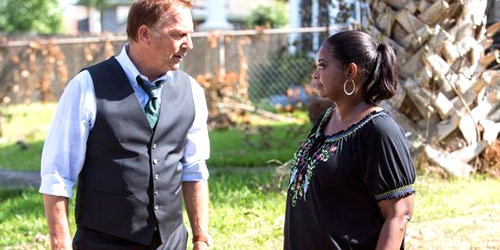
Once again, the Toronto International Film Festival (TIFF) showed more films, entertained more filmgoers, and hosted more cinematic luminaries than any film gathering in the world. With nearly 400 titles, it’s a major task just reading the catalog to determine which films to see. Over 60 percent are world premieres from over 75 countries, and sadly many will never arrive at the big screens in America except at film festivals, cable TV, or maybe Netflix. I was fortunate to view quite a few, and several of them stood out as exceptional films worthy of a progressive audience.
Some of the mainstream films with big name stars that drew crowds at their gala openings also provided serious food for thought. Racism was tackled in a dramatic vehicle starring Kevin Costner as a widowed lawyer raising his biracial granddaughter, and Octavia Spencer as the other fiercely proud grandparent demanding that the child be put in the custody of her delinquent son so she can be raised in an African American family. Many racial issues are addressed in Black and White, from white male privilege to historic prejudice about drug addiction, crime and poverty. But the whole story is handled with great sensitivity and deep compassion for all subjects involved, providing a needed fresh approach to the ongoing battle against racism. Great performances and a moving score by Terence Blanchard raise the emotional level.
A perceptive and powerful study of the epidemic of home foreclosures in America is brought to the screen in 99 Homes, containing some of the most memorable performances in recent history. Andrew Garfield plays the son of Laura Dern, in a family shocked by the intrusion of a cold-blooded realtor (played by Michael Shannon, who brings new meaning to the word “villain”) announcing the immediate evacuation of their property. It isn’t long before the audience discovers that most everyone in this story is a victim of the banks’ ruthless drive to wrest even more profit from the misfortune of homeowners who fall behind in their payments. Garfield, an unemployed construction worker, is eventually hired by the oily realtor to continue the drive of emptying homes. The moral dilemma of trying to survive in a system that destroys for profit is raised to a new level in this compassionate and empowering film directed by the brilliant Ramin Bahrani (Man Pushes Cart, Chop Shop) who makes us realize than even the realtor is caught in the trap.
The new impersonal methods of warfare are exposed in Good Kill, directed by New Zealander Andrew Niccol (Gattaca, Lord of War) and starring Ethan Hawke (Boyhood, Gattaca) as a fighter pilot removed to a bunker in Las Vegas to remotely control killer drones that function in the far-off Middle East. By spending days in the dark in front of computer screens, following commands from a heartless military commander on the East Coast, the whole process of fighting war is turned into a computer game. Actually, the drone program is designed on the Xbox, played by so many young men unwittingly being primed for real military action. Leaving the bunker every day to drive home and try to lead a normal life with his wife, Hawke is eventually consumed by the insanity of it all, and begins to rebel.
Articulate African filmmaker Abderrahmane Sissako is a rising star in world cinema, having directed Bamako, a powerful statement about exploitation and colonialism. He now presents another award-winning tale about the fate of Africa. Timbuktu covers the takeover of northern Mali by militant jihadists in 2012. It’s a harrowing study of a herdsman charged with murder played by Ibrahim Ahmed in a moving portrayal of a victim of Islamic “justice.” It’s a plea to embrace humanity and see the beauty in all people, especially the wonders of Sissako’s homeland of Mali.
TIFF featured several biopics covering important figures in science, the arts and politics. For many, it will come as a surprise that the great physicist Stephen Hawking led a healthy life into his twenties when he came down with his crippling disease, which surfaced in college while he was planning his marriage. Eddie Redmayne delivers a stunning realistic performance in Theory of Everything, where the development of a universal theory to encompass all cosmological knowledge is clearly explained. The personal life of a great scientist who has overcome insurmountable odds raises hope in humanity, assisting the quest to find truth for our probing questions. Director James Marsh is on a roll, after his impressive docs Project Nim and Man on Wire.
The overlooked, maligned and underestimated mathematician Alan Turing is one of history’s shameful chapters. The person who cracked the Nazi Enigma Code and helped win the war against Hitler and, not insignificantly, the inventor of the modern-day computer, should be enough to earn him respect and a place in history. But the fact that he was gay at the wrong time in the wrong country, earned him prison time and removal from history’s honor book. Imitation Game reveals his plight in an artful manner with exceptional acting and a gripping story line.
Not many Americans know about the FLQ, and that Quebec tried several times, unsuccessfully, to secede from Canada. Corbo is a film about the history of this radical group and one young man whom even Canadians know little about. He was a young radical who chose a violent path to social change, and died at 16 by a bomb he made that exploded accidentally. The film, focusing on the development of the FLQ, fails to develop enough back story to create compassion for the misled youth, or to display the anti-French racism, let alone explain the reasons why anyone would want to secede from Canada, but it does offer an exciting political story that prompts further research.
Pasolini, by iconoclastic American director Abel Ferrara, stars world-class Willem Dafoe in the title role bearing an uncanny resemblance to Pasolini in a dignified and respectful portrayal of the great Communist writer, filmmaker and poet who was also gay. Gratuitous sex scenes, however, will mar its ability to reach a wider audience. And the disproportionate emphasis on his homosexuality left little time to display his enormously important cultural contributions in the struggle for peace and justice. But Ferrara should be admired for bringing to the screen an artful attempt at keeping alive the story of this great progressive cultural icon.
Workers are struggling all over the world, and South Korea is no exception. Several films dealt with workers and labor struggles. From South Korea came a surprisingly uplifting social critique, Cart, reminiscent of great labor classics such as Norma Rae and Made in Dagenham. Discount retail store workers go on strike and collectivize to combat the harsh tactics of the oppressive company and its goon squads. Workers of the world unite!
Suha Arraf, writer of the two classic hits, Syrian Bride and Lemon Tree, delivers her directorial début in Villa Touma about four wealthy Christian women from Ramallah suddenly confronted with the care of an orphaned niece. Although extremely well acted, the story seems alien to the realities of the region, failing to draw the viewer into the trivial obsessions and concerns of the rich.
Another disappointing film from the same region is about the beloved writer who wrote one of the most endearing books in literature. Kahlil Gibran’s the Prophet drew great excitement prior to its world premiere in Toronto, being based on the beloved classic poetic tome by the great Lebanese writer/philosopher. Conceived by and starring the voice of Salma Hayek (Frida), the totally animated film features nine world-class animators each drawing a chapter of the famous book. Certainly important for bringing attention to the massive contributions of Arabs to world culture, the well-intentioned film seems conceptually flawed, coming across as a light Disney version, an animation exercise, at times cheapening the deeper concepts of the book. The ability to visualize words and meaning, especially when they’re indescribable, is better handled in a far lower budget but ultimately more rewarding film, The Prophet, by Gary Tarn.
Films from Iran always offer a satisfying cinematic experience – traditionally more humanistic, simple in story and dialogue, presumably to fall within the rigid guidelines of the fundamentalist Islamic state. But increasingly opposition voices, many coming from outside the country, are challenging the system. Red Rose is set during the 2009 protests, centering on a liberated activist fleeing from violence on the streets, who meets and shares quarters with an older gentlemen whose past is always in question. Obviously not filmed in Iran, since it includes nudity and sex scenes and questions the validity of the government by embracing the pro-democracy movement, the film raises questions about truth and authenticity.
Two films that were shot in Iran start out in a cab. Today begins with a cabdriver helping a pregnant woman get to a hospital. The details of her sad situation are gradually revealed as the story develops, but the focus is actually on the cab driver as he commits a random act of kindness. Tales, the other film starting out in a cab, goes on to connect several different stories and characters, one tying into the next. It’s a compelling compilation of short stories revealing a country that many Westerners know little about. Struggles of the working class in the social, economic and political realms come to the screen in all their urgency. Don’t let the simplicity of the plot keep you away from these moving films.
With a slew of great titles, it was just impossible to see all the relevant films on the progressive agenda. Famed progressive Haitian director Raoul Peck (who happens to be planning a historical epic on Karl Marx!) delivered his latest film about his native land and the earthquake that decimated the land and its people. Murder in Pacot is a drama that follows his documentary on the same subject, Fatal Assistance. Peck should be on the list of every progressive cultural activist, having provided some of the most astute politically-infused intelligent cinema.
An unlikely story about London’s queer community embracing Welsh coalminers fighting against Thatcher’s austerity economy was proudly presented in an inspirational comedy-drama, Pride. Another film on my watch list is the tense thriller from Ireland, called simply ‘71, yet another entry in the struggle against occupation, colonialism and racism.
More reviews by Bill Meyer at the 2014 Toronto Festival
Whose land? Interview with an objective Israeli filmmaker
Photo: Kevin Costner and Octavia Spencer in still shot from Black and White (Tracy Bennett, Treehouse Films)









Comments